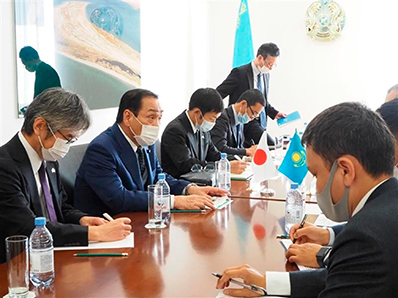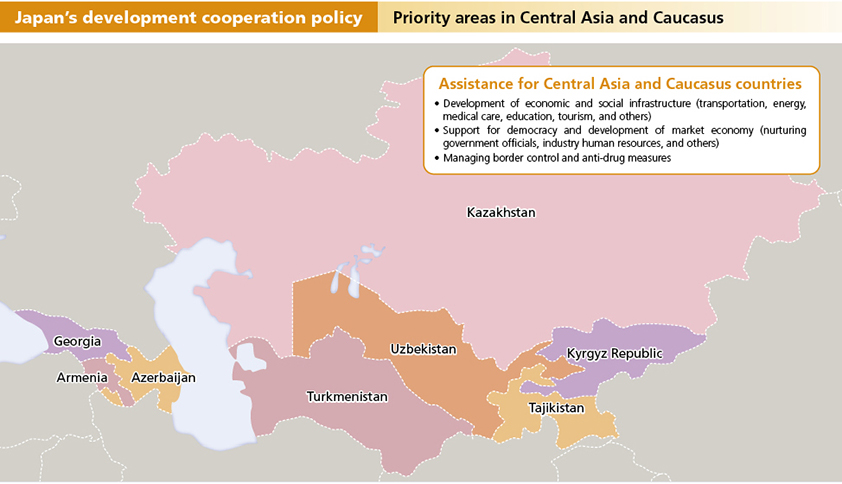6 Central Asia and Caucasus
The Central Asia and Caucasus region is located in a geopolitically important place linking East Asia, South Asia, the Middle East, Europe, and Russia. Its development and stability holds a great significance for those of the Eurasian region as a whole. In addition, this region is strategically important since it holds an abundance of natural resources such as oil, natural gas, and uranium.
Central Asia and Caucasus countries have been working toward transitioning to market economy systems and economic development since their independence in 1991. However, they still face issues such as aging economic infrastructure established during the former Soviet Union era, human resources development for the transition to a market economy, and the building of social systems including health and medical care.
● Japan’s Efforts

Then Parliamentary Vice-Minister for Foreign Affairs Nakanishi visits Kazakhstan and meets with First Vice Minister of Foreign Affairs Nuryshev (August 2021)
Japan provides assistance for the Central Asia and Caucasus countries in diverse fields such as improvement of infrastructure, human resources development, and the rebuilding of basic social services including health and medical care, in order to support these countries’ efforts toward resolving the aforementioned issues.
In particular, in regard to Japan’s relationship with the Central Asian countries, Japan launched the “Central Asia plus Japan” dialogue in 2004 and promotes cooperation within the region aimed at contributing to the peace and stability of Central Asia, as a partner for maintaining and strengthening the free and open international order. As for Japan’s relationship with the Caucasus countries, based on the “Caucasus Initiative” announced in 2018, Japan’s basic policy consists of two pillars, namely (i) assistance for human resources development of architects for state building (human resources development) and (ii) assistance for paving the way to “Appealing Caucasus” (infrastructure development and business environment improvement).
Major Japanese support related to infrastructure development in 2021 included a $195 million budgetary support ODA loan to Uzbekistan to support its efforts to promote reform of the power sector, and grant aid of approximately ¥1 billion to the Kyrgyz Republic to help protect from ground blizzards on the major highway linking the capital city of Bishkek and the second largest city, Osh.
Japan has accepted approximately 11,600 trainees from Central Asia and Caucasus countries and dispatched approximately 3,200 experts to those countries by 2020 as part of its support for human resources development. Moreover, Japan provides support in the development of human resources necessary for nation-building efforts, including through the implementation of the Project for Human Resource Development Scholarship, which is a study-in-Japan program for young government officials, the Development Studies Program, and the development of human resources for business at the Japan Center for Human Resources Development (see also the “Project Introduction Column” for human resources development for State Tax Service staff in the Kyrgyz Republic).
In regard to basic social services, as part of its assistance for COVID-19 response, Japan provided grant aid totaling approximately ¥3.2 billion through December 2021 to eight Central Asia and Caucasus countries for the provision of health and medical equipment. Japan has also provided a ¥15 billion COVID-19 Crisis Response Emergency Support Loan to Uzbekistan.
In addition, Japan provides support for managing border control and anti-drug measures in light of the situation in neighboring Afghanistan.

